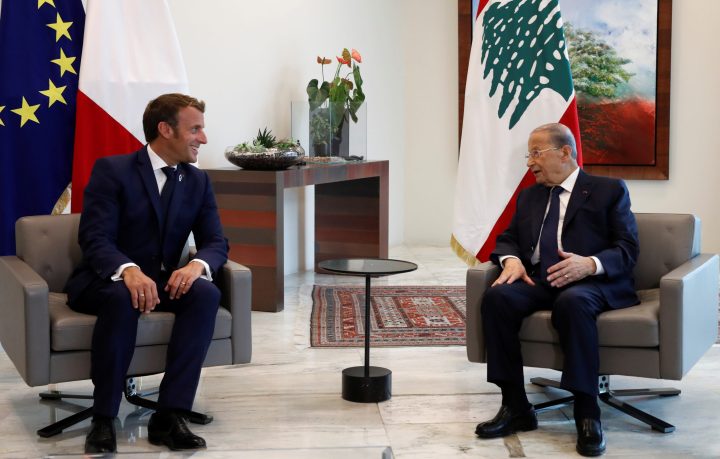Newsdeck
Macron warns Lebanese leaders of sanctions if reforms are not swift

BEIRUT, Sept 1 (Reuters) - French President Emmanuel Macron has warned Lebanese politicians they risk sanctions if they fail to set the nation on a new course within three months, stepping up pressure for reforms in a country collapsing under the weight of an economic crisis.
Visiting Lebanon for the second time in less than a month, Macron marked the country’s centenary by planting a cedar tree, the emblem of a nation that is facing its biggest threat to stability since the 1975-1990 civil war.
“It’s the last chance for this system,” Macron told POLITICO in an interview while travelling to Beirut on Monday. “It’s a risky bet I’m making, I am aware of it … I am putting the only thing I have on the table: my political capital.”
Macron said he was seeking “credible commitments” and a “demanding follow-up mechanism” from Lebanon’s leaders, including a legislative election in six to 12 months.
Should they fail to shift direction in the next three months, he told POLITICO, punitive measures could be imposed, including withholding bailout money and sanctions on the ruling class.
Lebanese politicians, some of them former warlords who have overseen decades of industrial-scale corruption, face a daunting task with an economy in meltdown, a swathe of Beirut in tatters after the Aug. 4 port blast and sectarian tensions rising.
Hours before he arrived on Monday, a new prime minister was designated, Mustapha Adib, following a consensus among major parties forged under pressure from Macron over the weekend.
Macron also visited Beirut last month in the immediate aftermath of the port explosion that killed more than 190 people and injured 6,000.
Macron said in Beirut that the international community must remain focused on the emergency in Lebanon for six weeks and said he was ready to help organise an international conference, in coordination with the United Nations, in mid to late October.
“I am ready to host it in Paris,” he said.
SHOW OF CONFIDENCE
Earlier on Tuesday, Macron planted a cedar sapling at a forest reserve in the mountains northeast of Beirut. The Elysée palace said this was to show Macron’s “confidence in the future of the country”.
The French air force display team flew overhead, leaving smoke trails of red, white and green, the national colours of Lebanon whose borders were proclaimed by France 100 years ago in an imperial carve-up with Britain. It gained independence in 1943.
Macron, who has been at the centre of international efforts to press Lebanese leaders to tackle corruption and take other steps to fix their country, began his trip late on Monday by meeting Fairouz, 85, one of the Arab world’s most famous singers whose music transcends Lebanon’s deep divisions.
He was greeted by dozens of protesters outside her home with placards reading “No cabinet by, or with, the murderers” and “Don’t be on the wrong side of history!”
He told reporters on Monday he wanted to “ensure that the government that is formed will implement the necessary reforms.”
Macron’s agenda includes a tour of the devastated Beirut port, a meeting with President Michel Aoun for a centenary reception and meetings with Lebanon’s various factions.
After being designated as premier on Monday, Adib called for the rapid formation of a government, immediate implementation of reforms and an agreement with the International Monetary Fund.
Lebanon’s economic crisis is rooted in decades of state corruption and waste that landed the state with one of the world’s heaviest public debt burdens.
Since October, the currency has collapsed and depositors have been frozen out of their savings while the real value of those deposits has collapsed in a paralysed banking system. Poverty and unemployment has soared in a nation that already hosts the world’s largest number of refugees per capita.
(Reporting by Raya Jalabi; Additional reporting by Michel Rose and Matthieu Protard in Paris; Writing by Tom Perry/Raya Jalabi; Editing by Edmund Blair)



















 Become an Insider
Become an Insider